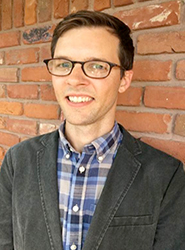Key to Teaching Success
David Kline’s Key to Teaching Success: Treating Students as ‘Real Thinkers’

That technique has allowed him to excel in the classroom; Kline received the College of Arts and Sciences’ 2021 Lecturer Excellence Teaching Award.
“I had always been really interested in reading theology, particularly Christian theology,” he said. “Still, my journey to religious studies was somewhat of a long one.”
Kline earned a bachelor’s degree in music from the University of Texas at Austin, but soon realized it would be tough to build a viable career in music. Studying online, he earned a Master of Letters in Bible and the Contemporary World from St. Andrews University in Scotland. Then, thinking he might want to go into the ministry, he enrolled at Duke Divinity School.
“But pretty soon into the degree program, I realized I was so much more interested in the intellectual side of things,” he said. After finishing his Master of Divinity degree at Duke, he went on to earn a master’s degree and doctorate in religious studies at Rice University.
At UT since 2017, Kline’s classes probe Christian theological perspectives on topics ranging from racism to climate change.
“You can’t understand climate change, the process and histories that led us to this point, without talking about Christianity and its colonial history,” he explained.
On one hand, there’s a vein of Christian thought that “God has given human beings the earth to do whatever they want with it, that recognizes human beings as the only species that matter. On the other hand, lots of Christian perspectives reject that and offer a much different, more ecological, earth-friendly perspective.”
Kline is also a student of critical race theory, which examines the intersection of race, society, and law in the United States. It’s a concept that’s become controversial and caused considerable headaches for academics.
“I was trained under ‘critical race theory’ before it was cool…. or not cool, depending on your point of view,” he said. ““Most of the time, when you hear ‘critical race theory,’ you are hearing about something that is totally and utterly disconnected to it has meant in the academic sense. The phrase has been mangled and misinterpreted and purposely weaponized.”
The bottom line, Kline said, is that “race and racism are still massive problems we are dealing with in the modern world and the contemporary U.S. They significantly impact the way our politics operate, how economic resources are distributed, and the way life is experienced.”
As a lecturer, Kline’s focus is teaching. Yet, he finds time for research.
“Research is part of what it means to be a good teacher at the university level. There is a direct relationship between scholarship and teaching,” he said.
In his spare time, Kline plays the electric bass and the upright bass. He jams with friends and picks up an occasional gig with a local band.
Although he plays a lot of blues and jazz, “I’m really a rock musician at heart.”
–Story by Amy Blakely